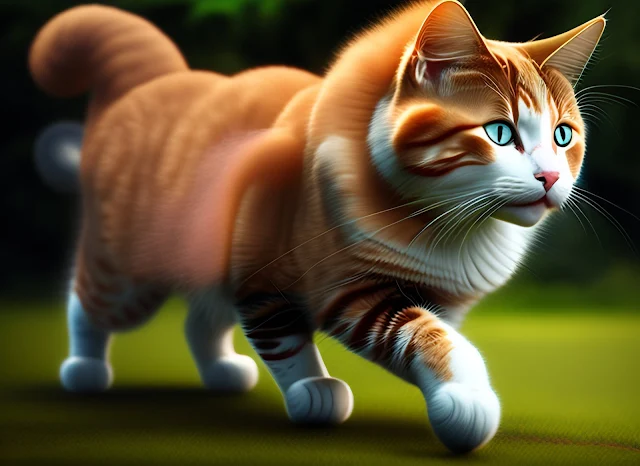Healthy Cats: A Guide to Feline Wellness
Cats are beloved pets for many households, and for good reason. They are independent creatures that bring joy and comfort to their owners, but to maintain their health and well-being, it is important to understand the various factors that contribute to their overall health. From diet and exercise to environmental factors and regular vet visits, there are many things you can do to ensure your cat is living a healthy, happy life.
Diet and Nutrition
A balanced and nutritious diet is essential for maintaining the health of your feline friend. Cats are obligate carnivores, meaning that they require a diet rich in animal protein to thrive. This can include a variety of sources such as poultry, fish, and red meat. It is also important to provide them with essential fatty acids, vitamins, and minerals, which can be found in commercial cat food or supplements.
When selecting cat food, it is important to choose high-quality options that meet the nutritional needs of your cat. Avoid products that contain fillers, preservatives, and artificial flavors, as these can be harmful to your pet's health. Additionally, it is important to pay attention to the protein-to-carbohydrate ratio in the food, as cats require a higher protein intake compared to carbohydrates.
In addition to a balanced diet, it is also important to monitor your cat's portion sizes and avoid overfeeding. Obesity is a common health issue among cats and can lead to other health problems such as diabetes and joint pain. If you are unsure about the appropriate portion size for your cat, consult with your veterinarian for a personalized recommendation.
Exercise and Playtime
In addition to a balanced diet, regular exercise and playtime are crucial for maintaining the health of your cat. Cats are natural hunters and require mental and physical stimulation to keep them happy and healthy. Encourage your cat to play and explore by providing toys such as balls, wand toys, and scratching posts.
You can also encourage physical activity by creating a stimulating environment with hiding places and climbing perches. Regular playtime not only benefits your cat's physical health but also helps to strengthen the bond between you and your pet.
Environmental Factors
Cats have a keen sense of smell and are highly sensitive to their environment. It is important to provide them with a clean and safe living space to reduce the risk of stress and potential health problems.
Regular cleaning of litter boxes, bedding, and food dishes is important to maintain good hygiene and prevent the spread of bacteria. Additionally, it is important to provide fresh water and a balanced diet to ensure that your cat is properly hydrated.
It is also important to create a safe environment for your cat by securing loose wires, removing toxic plants, and keeping sharp objects out of reach. This not only benefits your cat's health but also helps to prevent accidental injury.
Regular Vet Visits
Regular visits to the veterinarian are essential for maintaining the health of your cat. During these visits, your veterinarian can perform routine check-ups, administer vaccinations, and address any health concerns that may arise.
Regular check-ups help to detect potential health problems early on, allowing for prompt and effective treatment. Vaccinations help to protect your cat against common diseases and illnesses while addressing any health concerns help to keep your cat in top condition.
In conclusion, maintaining the health of your cat requires a combination of a balanced diet, regular exercise, a safe and clean living environment, and regular vet visits. By paying attention to these factors, you can help ensure that your cat is living a happy, healthy life
Common Health Issues in Cats
Despite the best care and attention, cats can still develop health issues over time. Some of the most common health issues in cats include:
Dental Issues
Dental problems, such as gum disease and tooth decay, are common in cats. These problems can lead to more serious health issues such as infections and can also cause pain and discomfort for your pet. Regular dental check-ups and cleanings with your veterinarian, as well as providing dental chews and toys, can help to prevent dental problems in cats.
Urinary Tract Issues
Urinary tract issues are also common in cats, particularly in male cats. These issues can be caused by a variety of factors, including bladder stones, infections, and blockages. Symptoms of urinary tract issues can include frequent or painful urination, blood in the urine, and frequent licking of the genital area. If you suspect your cat may have a urinary tract issue, it is important to consult with your veterinarian as soon as possible.
Skin Issues
Skin issues, such as flea infestations, allergies, and infections, are also common in cats. These issues can cause itching, hair loss, and redness, and can also lead to secondary infections if left untreated. Regular grooming and flea prevention measures can help to prevent skin issues in cats.
Gastrointestinal Issues
Gastrointestinal issues, such as vomiting, diarrhea, and constipation, can also be a concern for cats. These issues can be caused by a variety of factors, including dietary intolerance, parasites, and infections. If you suspect your cat may have a gastrointestinal issue, it is important to consult with your veterinarian to determine the underlying cause and appropriate treatment.
Caring for Senior Cats
As cats age, they may develop new health issues or experience a decline in overall health. Regular visits to the veterinarian are even more important for senior cats to ensure that any health issues are detected and treated early on.
In addition to regular vet visits, it is also important to make changes to your cat's care as they age. This may include adjusting their diet to accommodate for any changes in their metabolism, providing additional comfort and warmth, and making any necessary modifications to their living space.
The Importance of Early Detection and Treatment
Early detection and prompt treatment of health issues are crucial for maintaining the health and well-being of your cat. Regular check-ups and vet visits, as well as paying attention to any changes in your cat's behavior or health, can help to ensure that any potential health issues are detected and treated early on.
By following the tips outlined in this article and working closely with your veterinarian, you can help ensure that your cat is living a happy, healthy life.
You're tired of your furry feline leaving its mark on every piece of furniture in your home. You've tried everything from scratching posts to bubble wrap on the couch, but nothing seems to work. But just as you're about to give up hope, you come across Cat Spray Stop. You're skeptical at first, but you decide to give it a try.
You follow the instructions and to your amazement, the spraying stops! Just when you think your problem is finally solved, you come home to find that Fluffy has started spray marking again.
What could be causing this new behavior? Will Cat Spray Stop working again, or is it game over for your furniture? Find out in the next exciting chapter of your journey to a spray-free home.






Join the conversation
What's your favorite way to incorporate healthy habits into your daily routine?